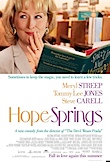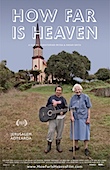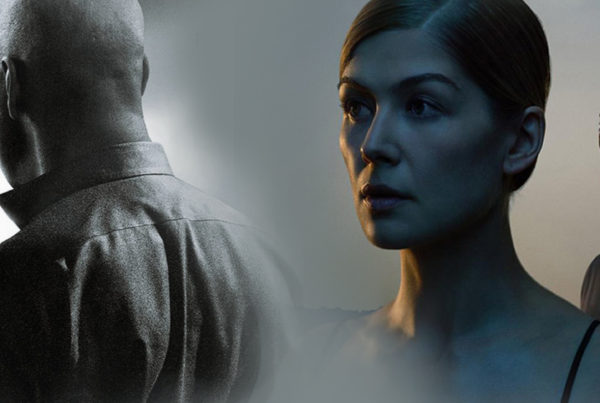 In Hope Springs, Meryl Streep proves once again that not only can she play any woman, she can also play everywoman. She’s Kay, an unfulfilled Nebraska housewife, married for 31 years to accountant Tommy Lee Jones and resigned to sleeping in separate bedrooms and cooking him his eggs every morning while he reads the paper. Except, she’s not resigned, she’s become determined. Determined to prove that marriage doesn’t just fizzle out after the kids leave home, that the past doesn’t have to equal the future.
In Hope Springs, Meryl Streep proves once again that not only can she play any woman, she can also play everywoman. She’s Kay, an unfulfilled Nebraska housewife, married for 31 years to accountant Tommy Lee Jones and resigned to sleeping in separate bedrooms and cooking him his eggs every morning while he reads the paper. Except, she’s not resigned, she’s become determined. Determined to prove that marriage doesn’t just fizzle out after the kids leave home, that the past doesn’t have to equal the future.
So, she signs them both up for “intensive couples counselling” with friendly therapist Steve Carell, in picturesque seaside Maine. Jones is gruffly resistant, of course, and it’s his deadpan sarcasm that prompts nost of the early comedy (their fumbling attempts to spice up their life provides the rest). As a comedy, Hope Springs is extremely gentle – much more gentle than the trailer would have you believe – but that gentleness suits the delicate subject and the script (by Vanessa Taylor) actually burrows in pretty deeply to a subject that, I’m sure, is pretty close to home for lots of viewers.
Chief pleasure is watching Jones and Streep show why they are the best in the business. If you go to see Hope Springs – and you can do a lot worse – then make a point of watching the actor who isn’t speaking. Director David Frankel (The Devil Wears Prada) has the good sense to shoot much of the encounters with Carell in two-shots – Jones and Streep on either side of a wide couch – and the reactions they have to the stories the other is telling are priceless and heartbreaking to the extent I found myself wondering what Bergman would have done with these actors. Hope Springs isn’t Scenes From a Marriage – it never pretends to be – but it is a decent and often amusing take on a subject Hollywood usually ignores.
 To anyone who has ever seen the Verhoeven/Schwarzenegger Total Recall (1990) then Len Wiseman’s remake will be utterly pointless. But it’s not meant for them, is it? It’s for the younger generation who wouldn’t be seen dead in the $2 section of the video store, and who don’t even care that it’s been done before. As every generation needs its own Jane Eyre, apparently every generation will now get its own Total Recall (and soon, Dredd and Robocop).
To anyone who has ever seen the Verhoeven/Schwarzenegger Total Recall (1990) then Len Wiseman’s remake will be utterly pointless. But it’s not meant for them, is it? It’s for the younger generation who wouldn’t be seen dead in the $2 section of the video store, and who don’t even care that it’s been done before. As every generation needs its own Jane Eyre, apparently every generation will now get its own Total Recall (and soon, Dredd and Robocop).
Regardless of how much regard you hold the original – and my regard for it is marginal at best – this version helped me to discover previously untapped levels of disengagement but it did prompt some stray thoughts while Colin Farrell was trying to discover whether he really is a futuristic superspy or not. Like, Bryan Cranston really needs to pick better projects for his Breaking Bad hiatuses. And Wiseman really is a hack using this film mainly as a way to further investigate the cinematic properties of Kate Beckinsale’s ass (cf Underworld, et al).
 Finally, a genuine triumph – NZ documentary How Far Is Heaven, about a year in the life of the people of Jerusalem on the banks of the Whanganui river. Directors Christopher Pryor and Miriam Smith deftly compare the lives of the Sisters of Compassion (only three resident at the time of shooting, down to two now) who have been living among the tangata whenua since the order was founded by Suzanne Aubert in 1892, and the spirited youth that they teach and counsel.
Finally, a genuine triumph – NZ documentary How Far Is Heaven, about a year in the life of the people of Jerusalem on the banks of the Whanganui river. Directors Christopher Pryor and Miriam Smith deftly compare the lives of the Sisters of Compassion (only three resident at the time of shooting, down to two now) who have been living among the tangata whenua since the order was founded by Suzanne Aubert in 1892, and the spirited youth that they teach and counsel.
Two deeply held belief systems co-exist in Jerusalem, and the beautifully photographed film presents us with multiple dichotomies – maori and pakeha, young and old, urban and rural – without taking any sides itself. Destined to be one of the greats.
Printed in Wellington’s Capital Times on Wednesday 29 August, 2012. Written in the departure lounge of Auckland International Airport, just before flying out to Telluride.


“Previously untapped levels of disengagement” Sir I tip my hat to you.
High praise coming from you, Nick. High praise indeed.